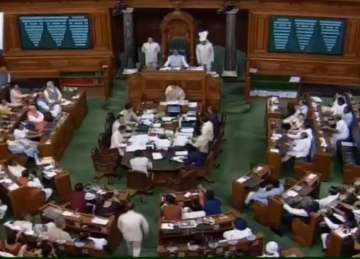Parliament gives nod to J&K bifurcation, resolution axing Article 370
Now the legislation needs only President's approval to become an Act which will bifurcate Jammu and Kashmir into two Union territories -- Jammu and Kashmir with a legislature, and Ladakh without a legislature.

Parliament on Tuesday passed the Jammu and Kashmir Reorganisation Bill 2019 and approved the resolution to abrogate the Constitution's Article 370.
The Bill, which was passed by Rajya Sabha on Monday, was approved by the Lok Sabha on Tuesday.
According to the final figures, 370 Lok Sabha MPs voted in favour of the bill while 70 were against it.
366 MPs favoured abrogation of article 370 while 66 MPs were against it -- in the second voting. In the first voting, 371 were in favour, 52 were against it.
Passage of the bill clears way for the state of Jammu and Kashmir to be bifurcated into two union territories -- namely Jammu and Kashmir and Ladakh.
Now the legislation needs only President's approval to become an Act which will bifurcate Jammu and Kashmir into two Union territories -- Jammu and Kashmir with a legislature, and Ladakh without a legislature.
The Lok Sabha session saw a heated debate between the government and the Opposition. While the government sought to underline the benefits of the bill and revocation of Article 370, there were fierce voices from the Opposition against the bill.
AIMIM's Asaduddin Owaisi aggressively put forward his stand against the Bill.
"I stand to oppose the bill. BJP has definitely live up to the electoral promise in their manifesto. But you have not lived up to your constitutional duties. You've indulged in breach of a constitutional promise of Article 370," the AIMIM president said.
He accused the government of making a historical blunder by seeking to pass the reorganisation bill and revoking Article 370.
Home Minister Amit Shah, who had introduced the bill and the resolution countered Asaduddin Owaisi's charge.
"We're not going to commit a historical mistake, we're going to correct one. After 5 yrs, seeing development in J&K under the leadership of PM Modi, ppl of the valley will understand drawbacks of Article 370," he said.
Shah later withdrew the Jammu and Kashmir Reservation (2nd Amendment) Bill, 2019, saying that the clauses incorporated in the legislation will automatically come into effect in the two new Union Territories.
The Bill will also be withdrawn from Rajya Sabha.
New dawn awaits, says PM Modi
Prime Minister Narendra Modi hailed the passage of bills on Jammu and Kashmir in Parliament as a "momentous occasion" in parliamentary democracy and said a new dawn awaits the state which is now free from the "shackles" of vested interest groups.
"Together we are, together we shall rise and together we will fulfil the dreams of 130 crore Indians! A momentous occasion in our Parliamentary democracy, where landmark bills pertaining to Jammu and Kashmir have been passed with overwhelming support!" he said in a series of tweets soon after the Lok Sabha passed the bills.
Parliament has given its nod to abolish the special status granted to the state under Article 370 and also to bifurcate it into two union territories.
"For years, vested interest groups who believed in emotional blackmail, never cared for people's empowerment. J&K is now free from their shackles. A new dawn, better tomorrow awaits!" the prime minister said.
"Saluting sisters and brothers of Jammu, Kashmir and Ladakh for their courage and resilience," he said, adding that the bills will ensure integration and empowerment of these regions.
These steps will bring the youth into the mainstream and give them innumerable opportunities to showcase their skills and talents, he said, adding that local infrastructure will significantly improve.